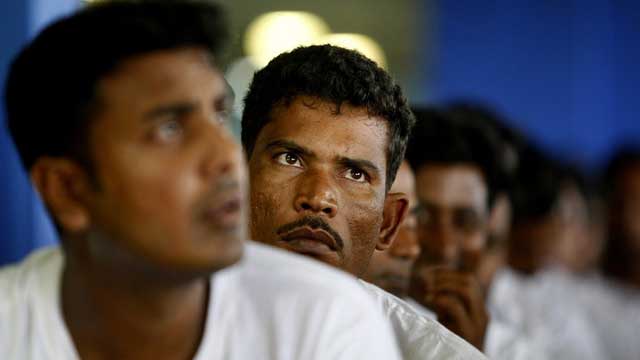Bangladeshi migrants in Malaysia fear an imminent food crisis as the lockdown continues amid the rising number of Covid-19 cases in the Southeast Asian country.
Malaysia recorded 109 new cases yesterday, bringing the total to 4,228, and the number of deaths to 67. The lockdown was initially till March 31 but later extended till April 14.
With Covid-19 cases not showing any signs of decreasing, Malaysian media reported, quoting officials, the lockdown may be extended even further to stem the virus that has globally affected 1.3 million people and caused more than 75,000 deaths, mostly in Europe and the United States.
The lockdown is taking a serious toll on foreign workers, including an estimated 800,000 Bangladeshis, as all businesses except for emergency services -- groceries, medicine shops, hospitals, gloves factories -- have been shut down.
Of the 800,000, an estimated two lakh Bangladeshi workers are undocumented, as their work permits were not renewed by their employers or agents.
Confined to mostly congested dormitories, Bangladeshi workers in Selangor and Kuala Lumpur told The Daily Star that they were either subsisting on their savings or loans. As days go by, they are increasingly worried how they are going to survive over the coming weeks.
Mohammad Abdul, a 40-year-old electrician working at a construction site at Bangsar in Kuala Lumpur, told The Daily Star he has been buying food on credit from a nearby grocery shop since he did not receive any payment from his employer for the last month.
"I don't know what's next. Allah knows," he said.
Undocumented migrant workers in the country are bearing the brunt of the lockdown as they don't receive pay when they don't work.
Although the Malaysian government has already announced that companies have to pay all regular workers -- including those paid on a daily basis -- during the lockdown, activists said some employers may not comply with the order.
Sohel Molla, 30, a construction worker from Petaling Jaya in Selangor, said he lives with seven of his colleagues in a labour camp. They are all living on their savings, he said, which are dwindling.
"If the lockdown continues, majority of the Bangladeshis in Malaysia will be in trouble. They won't have any money to buy food," said Sohel, who is from Gazipur.
Mohammad Harun Al Rashid, chief coordinator of "Bhalobashi Bangladesh" and a migrant rights activist based in Malaysia, said his organisation partnered with a Malaysian non-profit, "Our Journey", to register (online) migrants who need food immediately.
"In three days last week, we received about 50,000 applications from Bangladeshis. We could distribute food to around 1,200 of them," he told this correspondent over phone from Johor Bahru on Monday night.
If the lockdown continues, migrant workers, especially the undocumented ones, will face serious problems, he said.
Harun added that the Malaysian authorities are busy tackling the pandemic and addressing the needs of their citizens and they don't have much time to look into the needs of foreign workers.
"I had called some wealthy people and non-profits in Malaysia, but their feedback has not been very positive," he said.
The Bangladesh High Commission needs to take a bold step in reaching out to the Bangladeshi migrants and provide food and other essentials, he added.
An official of the Bangladesh High Commission said they had asked Bangladeshis to register their names by filling out a form on their official Facebook page last week.
"We got a good number of applications seeking emergency food," he told The Daily Star. He did not mention the number of applications.
The official, who did not want to be named as he is not authorised to speak to the media, said the high commission is partnering with some Malaysian organisations to deliver food to the migrants.
"We are sorting the list of those who applied and will start food distribution within this week. We hope we can overcome the crisis at the earliest," he said.





